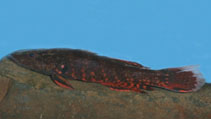| Family: |
Butidae (Gudgeon gobies) |
| Max. size: |
15 cm TL (male/unsexed); max.weight: 19.0 g |
| Environment: |
demersal; freshwater; brackish; marine; pH range: 7 - 8; dH range: 9 - 19, amphidromous |
| Distribution: |
IIndo-Pacific: from Reunion I., India, and Bangladesh to the Philippines, Indonesia, Thailand, Vietnam, Cambodia, Papua New Guinea, Australia and the Solomon Is. |
| Diagnosis: |
Dorsal spines (total): 7-7; Dorsal soft rays (total): 8-8; Anal spines: 1-1; Anal soft rays: 8-9. Dark longitudinal lines on body; caudal fin black with light margin dorsally; pectoral base with 1-2 black spots (Ref. 5493). |
| Biology: |
Inhabits brackish mangrove estuaries and lower reaches of freshwater streams, usually on mud bottoms (Ref. 44894). Usually found in lagoons and estuaries, particularly where there is vegetation (Ref. 6028, 79840). Occurs frequently in mangrove swamps (Ref. 2847, 79840). Occasionally ascends rivers (Ref. 6028). Feeds mainly on small fishes and crustaceans (Ref. 6028, 79840). Marketed fresh (Ref. 12693). |
| IUCN Red List Status: |
Least Concern (LC); Date assessed: 29 June 2016 Ref. (130435)
|
| Threat to humans: |
harmless |
Source and more info: www.fishbase.org. For personal, classroom, and other internal use only. Not for publication.
